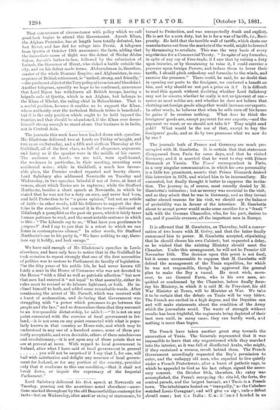We have said enough of Mr. Gladstone's speeches in Leeds
elsewhere, and have only here to notice that in the Guildhall he took occasion to repeat strongly that one of the first necessities of politics was to restore to Parliament its faculty of legislation. For the fifty years of his public life, he had never known till ,tely a man in the House of Commons who was not devoted to the House "with a filial as well as patriotic affection:" but now that men had entered it "not loyal" to that assembly, either its rules must be revised or its labours lightened, or both. He in- clined himself to both, and added some remarkable words. After mentioning the arrest of Mr. Parnell, which was received with a burst of acclamation, and declaring that Government was struggling, with "a power which presumes to go between the people and the law," and so demoralises them that they succumb to an irresponsible dictatorship, he asldel :—" It is not on any point connected with the exercise of local government in Ire- land,—it is not even on any point connected with what is popu- larly known in that country as Home-rule, and which may be understood in any one of a hundred senses, some of them per- fectly acceptable, and even desirable, others of them mischievous and revolutionary,—it is not upon any of those points that we are at present at issue. With -regard to local, government in Ireland, after what I have said a local government in general
you will not be surprised if I say that I, for one, will hail with satisfaction and delight any measure of local govern- ment for Ireland, or for any portion of the country, provided only that it conforms to this one condition,—that it shall not break down, or impair the supremacy of the Imperial Parliament."


































 Previous page
Previous page